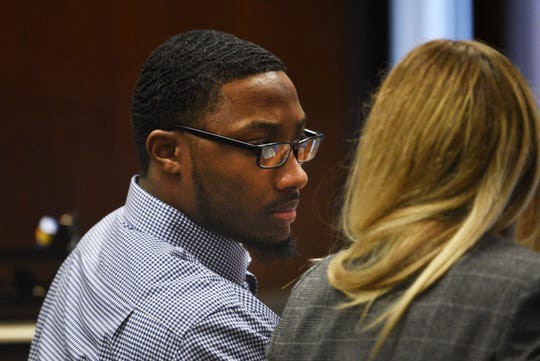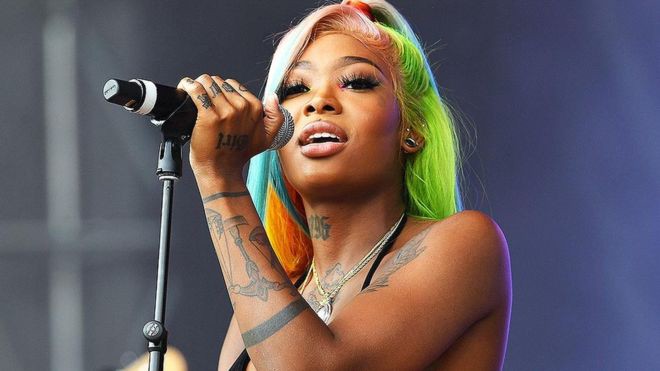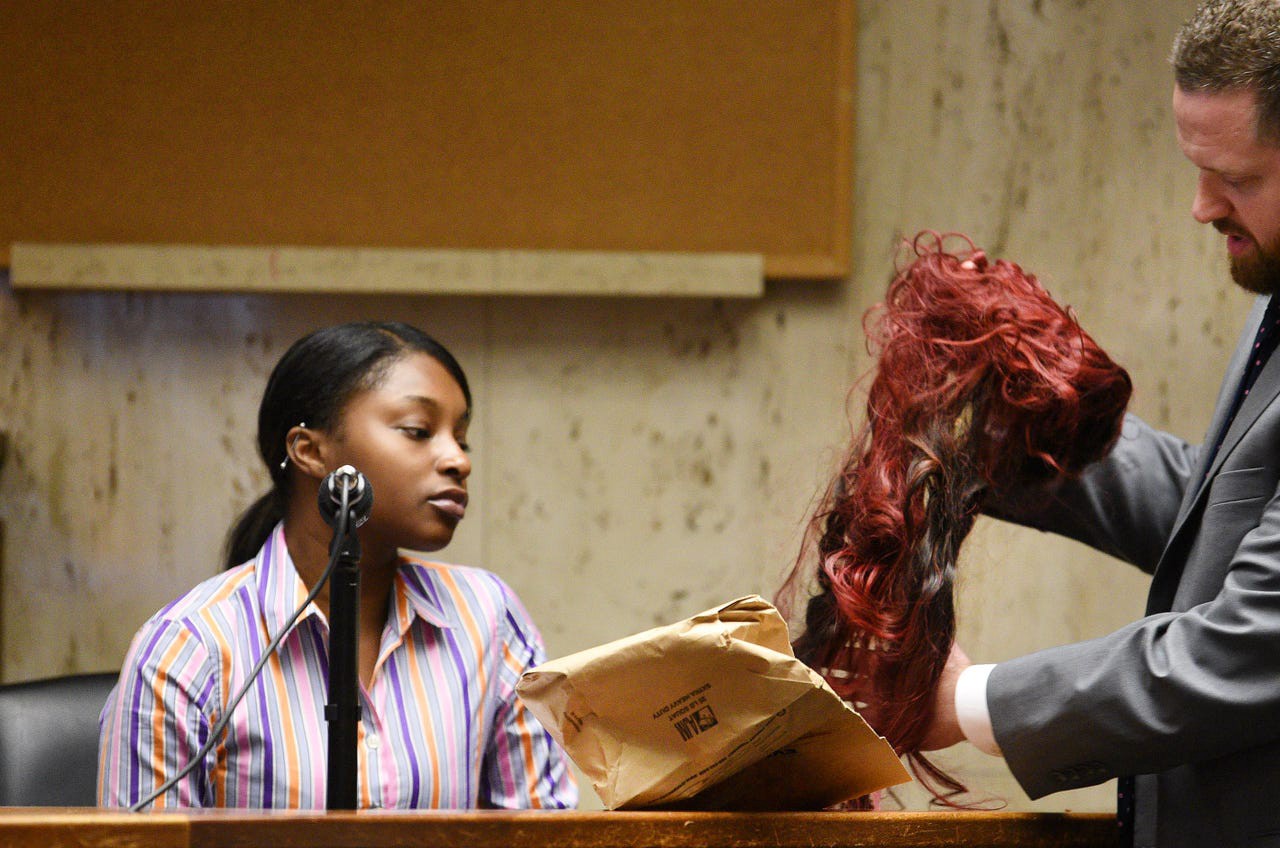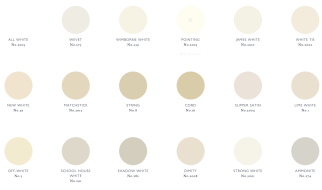Wheeler-Weaver highlights a bigger issue when it comes to the livelihood of Black women
 Khalil Wheeler-Weaver, charged in the death of three women, talks with one of his lawyers from the Public Defender?s Office, October 31, 2019. Photo by Mitsu Yasukawa/ Northjersey.com)
Khalil Wheeler-Weaver, charged in the death of three women, talks with one of his lawyers from the Public Defender?s Office, October 31, 2019. Photo by Mitsu Yasukawa/ Northjersey.com)
?He doesn?t look like someone who would do something like that?.
This is a common phrase assumption of Khalil Wheeler-Weaver, a young man in his early 20s who is being charged for the murder of three women and attempted murder a fourth woman. He stands with his back straight and his chin up. Often described as good looking, his black rectangular glasses and clean button-up shirts mimic the image of a graduate student. Even during his questioning in regards to the murder of Robin West, police thought him to be mannerly, compliant, and calm.
However, if America has learned anything from past notorious serial killers, it is that anyone can pass as ?normal? and put on a calm facade for the sake of getting through questioning from the police. Wheeler-Weaver is being charged with 11 criminal counts, including three counts of murder, kidnapping, aggravated sexual assault, desecration of human remains, attempted murder, and one count of aggravated arson.
Wheeler-Weaver?s alleged killings all took place within a span of three months, from September to October 2016. His trials finally began in October of this year. During the trial, it was noted that these three women had strikingly similar characteristics that likely led Wheeler-Weaver to believe he could escape any major consequences to his actions.
The Life of a Black Woman
The most disrespected person in America is the Black woman. The most unprotected person in America is the Black woman. The most neglected person in America is the Black woman.
? Malcolm X
The similarities between Wheeler-Weaver?s victims are not coincidental. Prosecutors took note that he seemed to consistently target people of which ?no one would take note?. In other words, the life of a young Black woman involved in sex work battling mental illness or homelessness isn?t going to make any breaking news headlines.
Wheeler-Weaver?s case is an example of a bigger issue. Black women are constantly denied the privilege to be children, or angsty teenagers, or mothers that go through childbirth with proper attention from medical professionals.
Black women are three to four times more likely to die during or after delivery than their white counterparts. According to the World Health Organization, maternal mortality is distributed unevenly among race. The maternal mortality rate of Black women is documented to be significantly higher. In 2005, the American maternal mortality ratio was 15.1 per 100,000 live births. However, it was 36.5 per 100,000 live births among Black or African American women, more than three times that of white women at the time.
By 2013, rates increased significantly, estimating that 700 to 900 expectant mothers die in the U.S. every year. More than half of those deaths and near-deaths are from preventable causes, with a substantially higher number being Black women. Black women are less likely to be taken seriously when they approach doctors regarding concerns over their health during pregnancy. Even celebrities are not immune to the maltreatment. In 2018, singer Beyonce? and tennis champion Serena Williams opened up about their life-threatening birth stories, and how their incidents could have been prevented.
Even in childhood, Black women tend to be overlooked in other big discussions like the school-to-prison pipeline ? the path of unfair treatment of adolescents that lead to involvement in the criminal system. Black girls are six times more likely to receive an out-of-school suspension than white students, who are usually given more chances of redemption after misbehaving.
In October 2019, a video showed a police officer using excessive force on an 11-year-old Black girl. The student was accused of violating school rules such as picking at a sign that was taped to a door and taking too many milk portions from the cafeteria; she was also falsely accused of assaulting the school?s principal. Somehow these offenses gave the former police officer the authority to shove her against the building, push her to the ground, and yell in her face as she continues to cry and beg to be let go, even after a school official clearly tells him to quit being excessive with the young girl.
The incident wasn?t just telling of the officer, but also the school for calling the police on an 11-year old girl committing detention-worthy infractions.
Black Women as Unsympathetic Characters
While the American public is slowly becoming more aware of topics surrounding mental health and mental illness, the overall public perception still does not reflect the reality of people with psychiatric disorders.
 April 2016, Robin West takes a selfie in a car (Facebook)
April 2016, Robin West takes a selfie in a car (Facebook)
In the case of Robin West, Wheeler-Weaver?s alleged victim who was murdered just days before her 20th birthday, it was revealed that she had always struggled in one way or another. Her parents split up while she was a baby, and she was unable to develop a relationship with her father until her teen years. In school, she took medication to control her attention-deficit hyperactivity disorder (ADHD). Robin was also known to struggle with her school work, especially reading and mathematics. Her parents, reflecting on her mood swings, believe it?s likely she suffered from an undiagnosed psychiatric disorder. She often bounced in and out of psychiatric placements and alternative-education schools, but was never reported to have any significant disciplinary problems.
For Black women, anxiety and depression are experienced more often and with more intense symptoms. This contradicts the public perception of Black women, which typically puts them into three archetypes: The Strong Black Woman, The Angry Black Woman, and The Jezebel/Vixen.
Because Black women are typically put into boxes between being strong and independent, being irate and angry, or being hypersexual, it makes it that much harder for society to view them sympathetically as victims.
If the gruesome murder of their daughter wasn?t enough, Robin West?s parents also faced infuriating news coverage headlines that referred to her as ?Philadelphia escort? or ?teenage hooker?.
They need to take ?escort? off of there, because she was a person and did not deserve to lose her life.
? Anita Mason, mother of Robin West
The dehumanization of Black victims in media is nothing new. Frequently, headlines and photos of choice often suggest that Black victims are to blame for their deaths, even in situations in which they are unarmed and pose no threat. However, with White domestic terrorists, the narrative is usually focused on the disbelief that someone who ?seemed so nice? could commit any type of violent act.
The same goes for Black people, especially women, and mental health. R&B singer Summer Walker recently announced she would be cutting her tour short in order to take care of her mental health. The artist has been very open about her struggle with social anxiety, which becomes further agitated with her hectic schedule and Meet and Greets. Cutting these dates would also mean a drastic cut in profit for herself. However, the singer experienced backlash from the public, who have accused her struggle with social anxiety to be ?an act?.
It goes back to the previously mentioned ?types? of Black women that people are accustomed to seeing. In Summer Walker?s case, most would view her to be ?The Jezebel? or ?Vixen?. The singer is typically seen wearing low cut tops revealing her cleavage and is easily identifiable with tattoos inked on her face, neck, chest, and arms. She is decorated with full-faced makeup, false eyelashes, and colorful hairstyles. In other words, her imagery does not line up with the public perception of what social anxiety ?looks? like.
 Summer Walker performs at the 10th Annual ONE Musicfest, September 2019; Photo by Getty Images
Summer Walker performs at the 10th Annual ONE Musicfest, September 2019; Photo by Getty Images
Conversely, there are White singers like Lorde who have also been transparent about how anxiety affects her overall performance as an artist. Billie Eilish has also been open about her struggles with anxiety and mental health, stating that she suffered daily panic attacks for as long as seven days straight.
Walker has also hinted that she may not be in the music industry for much longer, an understandable and likely responsible move on her part.
Violence Against Sex Workers
If Black women are considered to be the bottom of the barrel, Black sex workers are essentially underneath the said barrel.
While sex work is criminalized as a misdemeanor in the United States, the stigma around it has given an unspoken heir of justification for violence against those in the industry. Black women (both cisgender and transgender) are especially vulnerable to violence and death.
Violence against sex workers often goes uninvestigated. Nick Broomfield?s documentary Tales of the Grim Sleeper presents the story of convicted serial killer Lonnie Franklin, who?s crimes span the course of twenty-five years. His victims were mainly Black female sex workers or supposed drug addicts and the film questions if this is the reason why it took so long for the killer to be found and convicted.
While filming the documentary, Broomfield found that the South Central Los Angeles police force did not prioritize finding the killer. Broomfield describes the film as ?a story of disposable human beings?, highlighting the failure of police to identify reports about the Grim Sleeper and even the police use of the phrase ?no humans involved? to describe the cases.
The Value of Life
The case of Khalil Wheeler-Weaver magnifies a bigger issue when it comes to the livelihood of Black women. He is suspected of killing and disposing of these women in a style similar to that of the infamous Ted Bundy, and yet there has been hardly any visible news coverage on the matter. Just as there is disproportionate news coverage for missing Black children.
Unlike what he may have expected, the family and friends cared deeply about the alleged victims. Outside the disposal and burning of the bodies, there wasn?t much done as far as attempts to destroy evidence. He didn?t even do as much as delete or conceal his Google search history from his cell phone revealing he had looked up ?date-rape drugs? and ?how to make homemade poisons to kill humans?. Wheeler-Weaver was taken down by the family of Sarah Butler, a college student murdered during her Thanksgiving holiday break. The family took it upon themselves to create a fake social media profile in order to entice Wheeler-Weaver. Police made an arrest after he arrived at the location of a scheduled meetup for a promised sexual rendezvous.
 LaMia Brown (left) testifies against Khalil Wheeler-Weaver, identifying the presented hairpiece as belonging to her friend Sarah Butler, October 31, 2019; Photo by Mitsu Yasukawa/Northjersey.com
LaMia Brown (left) testifies against Khalil Wheeler-Weaver, identifying the presented hairpiece as belonging to her friend Sarah Butler, October 31, 2019; Photo by Mitsu Yasukawa/Northjersey.com
The public tends to attach Black Lives Matter to cases involving police brutality against Black men and women. However, it is also applicable to the lives of Robin West, Sarah Butler, Joanne Browne, and a fourth anonymous victim who survived her attack.
Every life has value, but research continues to show that Black lives come with price deductions. Another deduction for being a woman, another deduction for being poor, another deduction for being ? too big? for an 11-year-old, another deduction for being a sex worker, another deduction for being homeless, and the list goes on. Our society continues to place one life as more valuable than another, making it that much easier for murder crimes to go hardly acknowledged.
To be Black, to be a woman, to be mentally ill, to be homeless are all struggles on their own, but when combined it creates a formula to be forgotten.
UPDATE (2/19/2020): For those of you who are wondering, Khalil Wheeler-Weaver was found guilty of the murders on December 19, 2019. Since the initial story, Northjersey.com has released more information regarding the background of the victims including the survivor, Tiffany Taylor, whose testimony heavily contributed to the case.


